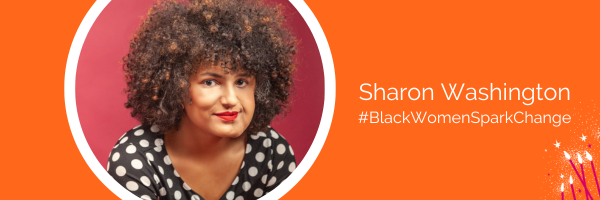
Sharon Washington is the founder and CEO of Sharon Washington Consulting, which provides sustainable strategies for institutions to promote equity, inclusion and belonging by cultivating racial literacy and anti-racism.
The pathway to this work started when Sharon was just four years old and her family moved from Oakland, California to rural Oregon where Sharon’s family was the only Black family in town and experienced severe racism.
“I was confronted with my race from a very young age and dealt with it daily,” Sharon says. “In trying to find what my race meant to me from a place of empowerment and pride, I really centered myself, my learning and development in ways that I could tend to the wounds that I carried from my upbringing,” she explains.
After earning her undergrad degree in African American Studies at Temple University, Sharon earned a Masters in Public Health from Columbia University. Here she focused on the intersection of racial and sexual trauma as it’s experienced by people of color, and for her Doctorate in Education she researched how the medical school curriculum prepared students to engage with diverse patient populations.
“I wasn’t surprised that they said it didn’t prepare them well,” she adds.
Through her studies and experiences, Sharon gained the skills and confidence to address racism and other forms of trauma head-on and she now brings a trauma-informed approach to her consulting work.
“What I’m offering to any group or individuals within any industry, is filling the curriculum and social gaps that we’ve all had in our formal and informal education in our segregated neighborhoods,” she shares.
Working Sustainably
Before starting her own organization, Sharon worked as a public health educator, centering her teaching on historical trauma and racial inequities. However, after experiencing a harmful encounter with a student and the subsequent lack of support from leadership, she decided it was time to prioritize her safety and mental health.
“I quit my job and started working for myself full time,” she shares.
Sharon began anti-racism consulting work for a residency program in Northern California. Once the pandemic placed an emphasis on anti-racism more widely, she began expanding her client base.
“It really created an opportunity for sustainability with working for myself, really focusing on diversity, equity and inclusion by grounding it in a critical race analysis perspective that charges leaders with deep self-reflection,” she says.
Working for herself, Sharon has to remind herself not to undervalue herself – and she wants other Black women to also know their worth.
“Work actively and consciously on the process of learning how to quantify the value of your contribution,” she advises.
Running her own business also means that Sharon is constantly innovating and growing.
“Identify what needs to change or what you would do differently and allow yourself to track that,” she says. “That will be the foundation of your solutions to significant challenges.”
Sharon referenced her own notes when building a new interactive online learning platform for her organization.
“If I didn’t take the time to write my ideas down,” she shares, “Creating these programs wouldn’t have been so easy. I’ve been able to copy and paste my own ideas I’ve captured over the course of years, to expedite the process of growing my business and having an impact now.”
Finding Inspiration
While Sharon naturally draws energy from the work that she does, she also looks to inspiring women, especially Harriet Tubman, for guidance.
“She was a truly brilliant person,” she says. “Pave a pathway for yourself and when that leads to freedom, just follow that. Do that again, bringing others in that same way.”
Sharon works hard to stay open and invite others along the journey of equity and anti-racism, but when people say they aren’t confident enough to put their new learnings into practice, she encourages them to keep trying.
“There is no blueprint for an equitable society. We’re all finding our way, building on the foundations laid by our ancestors, to create the world we need and want. We’ve never seen it, it’s never existed,” she explains.
Ultimately, Sharon keeps moving forward on this journey because it’s better to work toward change than to stay stagnant.
“Taking those next steps, being open with our vulnerability in this work, and trusting that we’re heading in the right emergent trajectory has been inspiring for me,” she says.
